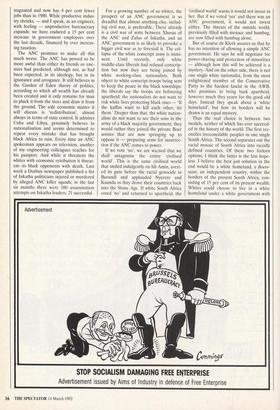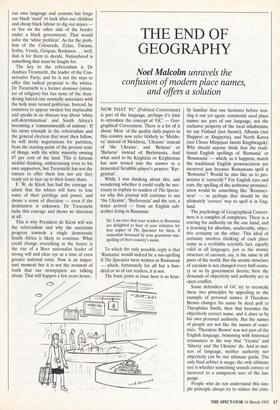ALL WHITE ON THE NIGHT?
Andrew Kenny wonders
how he should vote in South Africa's referendum
Richards Bay ON TUESDAY, we white South Africans will be invited to answer 'yes' or `no' to this question: Do you support the continuation of the reform process which the State President began on 2 February 1990 and which is aimed at a new constitution through negotiation?
It may not be moral for the white peo- ple, 15 per cent of the South African popu- lation, to decide in a referendum the future of the other 85 per cent. But the matter is not one of morality but the stark- est practicality. The whites are all-impor- tant. The white people are the reason South Africa has a developed economy, while African countries with better natural resources have not. The whites' presence is the reason the outside world finds South Africa so interesting, and their absence is the reason it finds the rest of Africa so boring. The whites can muster overwhelm- ing physical force and in any naked power struggle could crush the black majority. So de Klerk must have white support for his new constitution.
Each side in the referendum debate speaks almost exclusively about the horri- ble consequences of voting the wrong way: if you vote 'yes', there will be a black majority government dominated by the ANC, and South Africa will follow black Africa into economic collapse; if you vote `no', there will be civil war and complete ostracism by the international community. There is force in both warnings but they obscure a larger question: Do we want South Africa to remain one country or be partitioned along racial lines?
The two years since Nelson Mandela's release have been terrible ones for South Africa. Like Mr Gorbachev or, more appropriately, like General Smuts, F. W. de Klerk's popularity has fallen at home as it has risen abroad. Ceaseless blood-letting among the blacks and a torrent of violent crime has frightened the whites. The econ- omy has fallen into deeper decline than can be explained by the world recession. Infla- tion is running at 16 per cent and, with a recent 24 per cent increase in the money supply, it is unlikely to come down. Unem- ployment is rampant, so that fewer than one matriculant in ten can find a job and it is said that 40 per cent of blacks are out of work. The drought this year, destroying over half the maize crop, has reminded us how fragile South African agriculture is. The long-term indications are even worse. With the price of our minerals dropping year by year, South Africa's only hope for economic growth is her manufacturing industry, but over the last decade it has stagnated and now has 4 per cent fewer jobs than in 1980. While productive indus- try shrinks, — and I speak, as an engineer, with feeling — unproductive bureaucracy expands: we have endured a 15 per cent increase in government employees over the last decade, financed by ever increas- ing taxation.
The ANC promises to make all this much worse. The ANC has proved to be more awful than either its friends or ene- mies had predicted, although not, as had been expected, in its ideology, but in its ignorance and arrogance. It still believes in the Garden of Eden theory of politics, according to which all wealth has already been created and it only remains for man to pluck it from the trees and draw it from the ground. The sole economic matter it will discuss is 'redistribution', almost always in terms of state control. It admires Cuba and Libya, genuinely believes in nationalisation and seems determined to repeat every mistake that has brought black Africa to ruin. Every time an ANC spokesman appears on television, another of my engineering colleagues reaches for his passport. And while it threatens the whites with economic retribution it threat- ens its black opponents with death. Last week a Durban newspaper published a list of Inkatha politicians injured or murdered by alleged ANC killer squads; in the last six months there were 100 assassination attempts on Inkatha leaders, 21 successful. For a growing number of us whites, the prospect of an ANC government is so dreadful that almost anything else, includ- ing civil war, is preferable. There already is a civil war of sorts between Xhosas of the ANC and Zulus of Inkatha, and an ANC government is as likely to provoke a bigger civil war as to forestall it. The col- lapse of the white conscript army is immi- nent. Until recently, only white middle-class liberals had refused conscrip- tion but now they are being joined by white working-class nationalists. Both object to white conscript troops being sent to keep the peace in the black townships: the liberals say the troops are bolstering apartheid; the nationalists do not want to risk white lives protecting black ones — 'If the kaffirs want to kill each other, let them.' Deeper than that, the white nation- alists do not want to see their sons in the army of a black majority government; they would rather they joined the private Boer armies that are now springing up to oppose it — preparing arms for insurrec- tion if the ANC comes to power.
If we vote `no', we are warned that we shall antagonise the entire `civilised world'. This is the same civilised world that smiled indulgently on Idi Amin, avert- ed its gaze before the racial genocide in Burundi and applauded Nyerere and Kaunda as they drove their countries back into the Stone Age. If white South Africa voted `no' and returned to apartheid, the
`civilised world' warns it would not invest in her. But if we voted `yes' and there was an ANC government, it would not invest either. The threats of the outside world, previously filled with menace and humbug, are now filled with humbug alone.
But of course de Klerk assures us that he has no intention of allowing a simple ANC government. He says he will negotiate for power-sharing and protection of minorities — although how this will be achieved is a mystery. And on the other side, there is not one single white nationalist, from the most enlightened member of the Conservative Party to the hardest fascist in the AWB, who promises to bring back apartheid, however much they yearn for the good old days. Instead they speak about a 'white homeland', but how its borders will be drawn is an equal mystery.
Thus the real choice is between two models, neither of which has ever succeed- ed in the history of the world. The first rec- onciles irreconcilable peoples in one single South Africa. The second separates out the racial mosaic of South Africa into racially defined countries. Of these two forlorn options, I think the latter is the less hope- less. I believe the best just solution in the end would be a white homeland, a Boere- swat, an independent country, within the borders of the present South Africa, con- sisting of 15 per cent of its present wealth. Whites could choose to live in a white homeland under a white government with
our own language and customs but forgo our black 'maid' to look after our children and cheap black labour to dig our mines or live on the other side of the border under a black government. That would solve the 'white problem'. As for the prob- lem of the Coloureds, Zulus, Tswana, Sotho, Venda, Griquas, Bushmen . . . well, that is for them to decide. Nationhood is something that must be fought for.
The key to the referendum is Dr Andries Treurnicht, the leader of the Con- servative Party; and he is not the man to offer this radical proposal to the whites. Dr Treurnicht is a former dominee (minis- ter of religion) but has none of the thun- dering hatred one normally associates with the holy man turned politician. Instead, he contrives to appear modest but implacable and speaks in an obscure way About 'white self-determination' and South Africa's becoming a 'commonwealth of nations'. If his views triumph in the referendum and the general election that must then follow, he will invite negotiations for partition, from the starting-point of the present state of things, with the white minority owning 87 per cent of the land. This is fatuous wishful thinking, embarrassing even to his own supporters, but Treurnicht has not the stature to offer them less nor are they ready yet to face up to their lesser share.
F. W. de Klerk has had the courage to admit that the whites will have to lose some of their privilege and power, and shows a sense of direction — even if the destination is unknown. Dr Treurnicht lacks this courage and shows no direction at all.
This is why President de Klerk will win the referendum and why the uncertain progress towards a single democratic South Africa is likely to continue. What could change everything in the future is the rise of a Boer nationalist leader of strong will and clear eye at a time of even greater national crisis. Now is an impor- tant moment but it is not the moment of truth that our newspapers are talking about. That will happen a few years hence.




























































 Previous page
Previous page